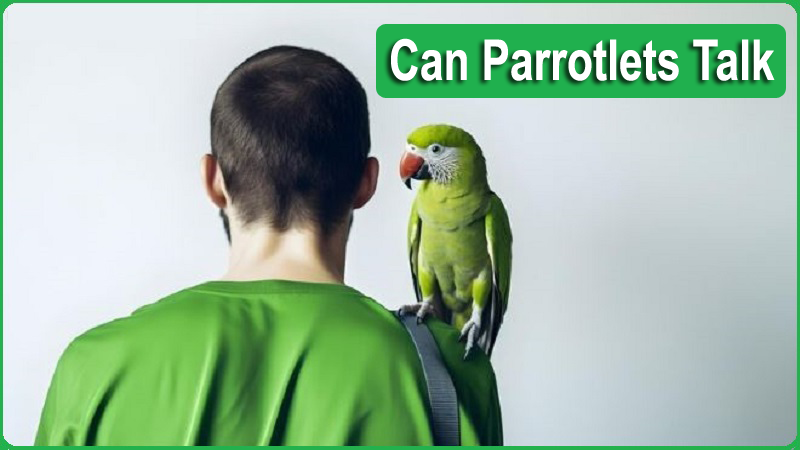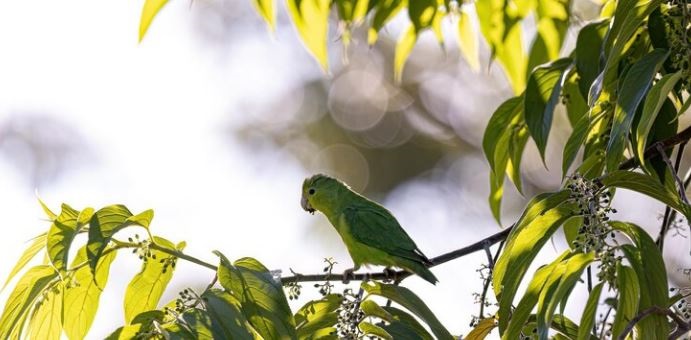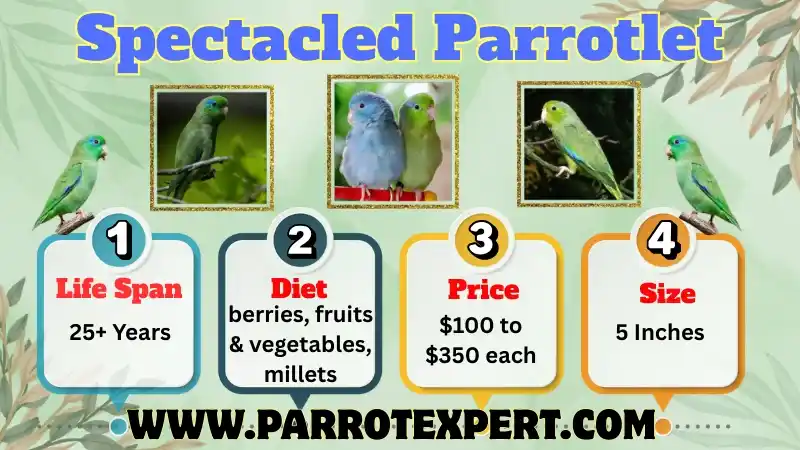Parrotlets count the smallest members in parrot family. They are most eminent for their vibrant colors, playful personalities, and impressive intelligence. While larger parrot species like African Greys and Amazons are renowned for their exceptional talking abilities. But, the question remains: can parrotlets talk; and how to develop the skill of human speech in them?
Parrotlets are denominating apart in avian world, due to their ability to reproduce human language. However, they are compacted in size, usually around 5 inches in length. Still, they have potential to get pack a punch with their vocal abilities.
Where you are going, give us some time! Here, you will get all possible stuffs regarding parrotlets talking with human beings; and how can you teach parrotlet to talk of human speech.
The Speech Capabilities of Parrotlets
There are some outlined points about the speech capabilities of parrotlets:
Understanding Avian Vocalization
All birds make communication with each other via a complex system of vocalizations. Vocal learning is an essential factor for parrot’s behaviour. They are one of the few groups of animals’ species, who have potential to learn new sounds throughout their lives.
This capability has closely relation to the neural architecture of their brains, specifically the song control nuclei. This is a special brain region that helps to control the learning and production of sounds.
Vocal Range for Parrotlets
Although, parrotlets are small size; still they have capabilities of producing a different of sounds. parrotlets’ vocalizations like as chirps, whistles, and calls; they serve different objectives, including attracting mates, warning of danger, and expressing excitement.
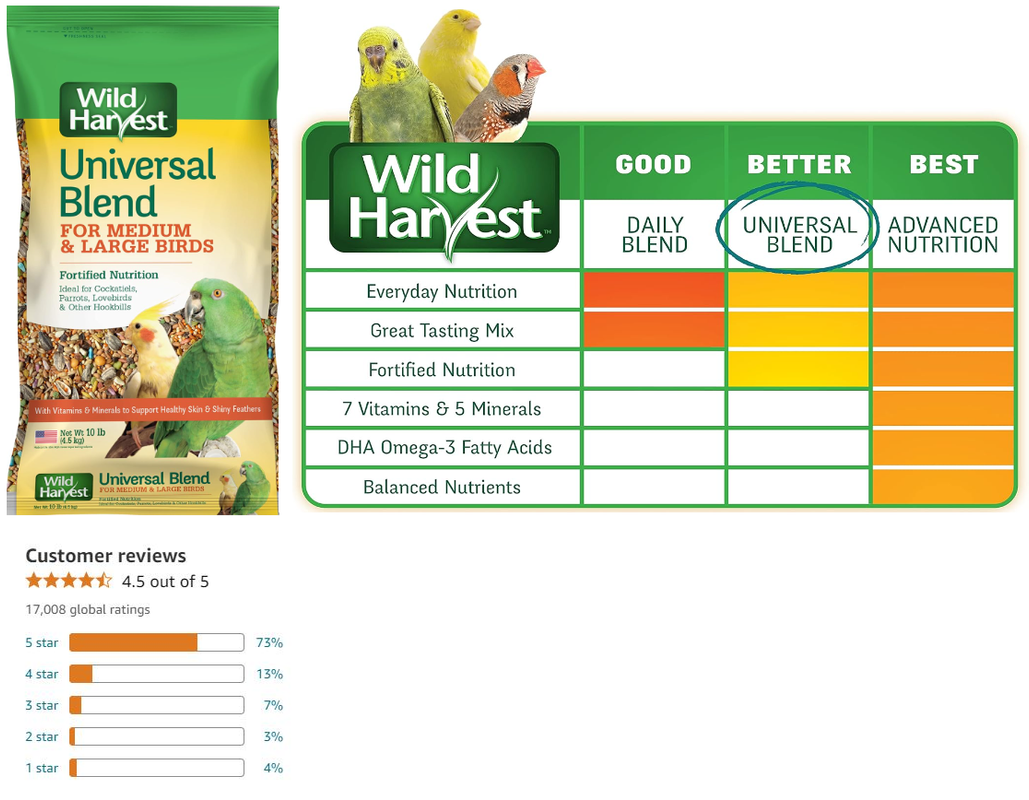
But, in captivity, few parrotlets are able to mimic environmental sounds, and human speech at a certain level. However, parrotlets’ vocal range is not as extensive as compared of larger parrot’s species.
Mimicry and Human Speech
As you know about, all parrots have the potential for mimicry; the extent to which they can imitate human speech varies significantly among species and individuals.
Parrotlets, specifically, can learn to mimic human words and phrases, but their speech is often not clear, and more limited as compared to larger parrots.
Parrotlets’ clarity of their speech gets influence their small size, and the structure of their vocal apparatus.
Factors Influencing Talking Ability
Here, we will show your some significant factors that can effect their raking abilities, as following them:
Also Read: Can Macaws Talk? Exploring Macaw Vocalizations
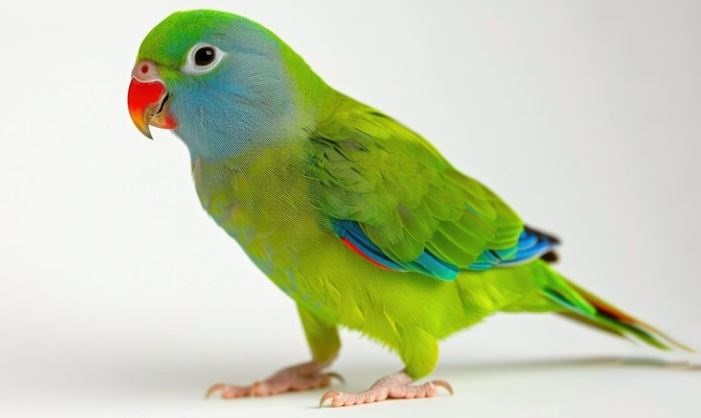
Species and Genetics
Within the parrot family, few species get more incline to mimic human speech as compared others. For example, Pacific Parrotlet (Forpus coelestis) is known to be more vocal and capable of mimicking words than other parrotlet species.
Moreover, genetic factors also play a vital role, because some birds may get naturally more incline to vocalize and mimic sounds.
Socialization and Training
The environment is main factor, where parrotlet is raised significantly impacts its capability to talk. Such birds; those are frequently exposed to human speech and make interaction closely with their owners. They are more likely to mimic words and phrases.
Take training with consistently and socialization from a young age can enhance a parrotlet’s talking capability. In training birds to mimic human speech, Repetition and positive reinforcement can be essential strategies.
Individual Personality
As like humans, parrotlets have also some unique personalities that get influence on their behavior, including their propensity to talk. Some parrotlets may be getting more curious, and eager to interact with their owners that leading to better mimicry skills.
But, other parrots might be more reserved, and less inclined to mimic human speech. In parrotlet’s speech training, it is important to understanding and working with a parrotlet’s personality
How to Teach Your Parrotlet to Talk?
When you try to teach your parrotlet to talk, then it can be a fun and rewarding experience. So, it gets foster a deeper bond in between you and your feathered friend. Here, we will show you some essential tips that help to teach your parrotlet to talk:
Also Read: Do Cockatoos Talk? Talking Abilities of Cockatoos
Keeping Remember! Parrotlets can start speaking as early as 3 months old.
Be Consistent
- You should set aside time every day for consistent training sessions at the same time in the same room
- Practice every day using the same few words, and phrases to avoid overwhelming your parrotlet
Practice Patience
- You should be known that parrotlets are not the most talkative parrot species. So, you must be patient during training.
- It will take time for your parrotlet to learn how to talk. So don’t get discouraged, if it doesn’t happen right away.
Talk to Them All the Time
- You always expose your parrotlet to speech by talking or singing to it, whenever you’re together.
- The more you speak to it, the better your chances of teaching it to talk.
- Use simple phrases when providing daily care, so it can associate words with actions.
Have Realistic Expectations
- Parrotlets can learn to talk, but you shouldn’t expect them to have a large vocabulary.
- Males can generally mimic better than females, but with time and patience, you can teach either sex to talk.
Encourage Mimicry
- Parrotlets have an instinctive ability to mimic the calls of their parents, and learn the sounds of their flock.
- Imitating their sounds can encourage them to mimic yours.
- Holding your parrotlet very close to your mouth while talking seems to encourage them to mimic you.
Associate Words with Actions
- Rather than teaching individual words, use short phrases.
- Associating a phrase with an action teaches more than simple speech, it helps with training.
- Examples include saying “Time for nite-nite” as you cover the cage each evening
Don’t Get Unrealistic Expectations
Comparing to Larger Parrots
Parrotlet owners should be known about their pet’s talking abilities. We accept that parrotlets can learn to mimic human speech, but they are unable to get clarity and vocabulary level of larger parrots like African Greys or Cockatoos. Parrotlet speech has less distinct and limited vocabulary.
Individual Differences
Each parrotlet has unique capability, and their ability to talk can be varying widely. Some parrotlets may learn to say a few words clearly, but others might only mimic sounds or remain relatively quiet. Should keep patience and understanding when you work with these birds.
Enhancing Communication
We accept that a parrotlet does not become a proficient talker; but it can still make communication effectively with its owner through other vocalizations and body language. If, parrot’s owners understand these cues, then make strengthen the bond in between the bird and its owner.
Age and Sex Factors in Speech Development
Parrotlets exhibit several interesting patterns in their vocal development that differ from songbirds:
Vocal babbling begins in parrotlet nestlings at around 21 days post-hatch (dph), the same age they produce their first signature contact calls. This is months earlier than songbirds, which typically babble after dispersing and reaching sexual maturity.
Both male and female parrotlet nestlings babble, in contrast to songbirds where only males babble. Parrotlet babbling consists of a diverse mix of adult and nestling calls, but not yet integrated into their respective functional contexts.
The onset of parrotlet babbling precedes sexual maturity and likely occurs before their hypothalamic-pituitary-gonadal axis is fully functional. Corticosteroids, but not gonadal steroids, modulate parrotlet babbling.
Parrotlet babbling occurs in the presence of siblings with large age differences, ranging up to 17 days. The number of preferred preening partners a nestling has delays the age at which they produce their first signature contact call.
Parrotlet nestlings show adult-like adrenocortical function as early as 13 dph, a week before babbling begins. This may help tailor vocal learning to the complexity of their social environment.
Comparison to Other Talking Birds
Here, we will spread light on a concise comparison of parrotlets to other popular talking bird species:
| Aspect | Parrotlets | African Grey Parrots | Budgerigars | Amazon Parrots |
|---|---|---|---|---|
| Vocabulary Size | Limited, several words and phrases | Extensive, often 100+ words | Large, can learn hundreds of words | Extensive, rivaling African Greys |
| Clarity of Speech | Clear but simple | Exceptionally clear and human-like | Clear but high-pitched and rapid | Clear, expressive, often enthusiastic |
| Learning Ability | Intelligent but less capable than larger parrots | Higher intelligent, learns throughout life | Quick learners, especially young males | Intelligent, enjoys interactive learning |
| Sociability | Social but somewhat independent | Highly social, needs constant engagement | Highly social, bonds closely with humans | Very social, forms strong bonds with caregivers |
| Training Requirements | Early and consistent training, stimulating environment | Requires mental stimulation, social engagement | Regular interaction, consistent training | Consistent repetition, positive reinforcement |
| Best Learners | Young males | All ages, best results with consistent training | Young males | All ages, thrives with interactive training |
| Interaction Needs | Moderate | High | Highly | High |
| Overall Speech Capability | Moderate | Excellent | Good | Excellent |
Challenges and Considerations
There are various challenges and considerations related to vocal development, and learning in parrotlets and other parrot species.
General Challenges Are
Individual Variability: Not all birds of a given species will develop the ability to mimic human speech. Individual differences in personality, intelligence, and social tendencies can significantly influence speech development.
Training Consistency: Successful speech development requires consistent and patient training. Irregular training sessions or lack of interaction can hinder a bird’s ability to learn and retain new words.
Environmental Factors: A stimulating environment is crucial for speech development. Birds need a variety of sounds and regular social interaction to encourage vocal mimicry.
Health and Well-being: Stress, illness, or poor living conditions can negatively impact a bird’s ability to learn and mimic speech. Ensuring the bird is healthy and stress-free is vital.
Bonding and Socialization: Birds that are not well-socialized or do not bond closely with their caregivers may show less interest in mimicking human speech.
Considerations for Enhancing Speech Development
Start Early: Begin training young birds during their critical learning period for the best results.
Consistent Training: Engage in regular, daily training sessions with positive reinforcement techniques.
Varied Environment: Provide a stimulating environment with a variety of sounds, toys, and social interactions.
Health Monitoring: Ensure the bird is in good health and address any stressors in their environment.
Interactive Play: Incorporate speech training into playtime to keep the bird engaged and motivated.
Patience and Persistence: Be patient and persistent, as speech development can take time and varies greatly among individuals.
FAQs (Frequently Asked Questions)
At What Age Do Parrotlets Start Talking?
Parrotlets are most receptive to learning speech at a young age, typically around 3 to 4 months old. The critical learning period usually occurs within the first year of life.
Do Male or Female Parrotlets Talk More?
Male parrotlets are generally more proficient at learning to talk than females, but some female parrotlets can also learn to mimic words and sounds.
How Many Words Can a Parrotlet Learn?
While parrotlets may not develop as extensive a vocabulary as larger parrots; they can learn several words and short phrases with consistent training and interaction.
Can Adult Parrotlets Learn to Talk?
Yes! Adult parrotlets can learn to talk, but they may not be as quick or as proficient as younger birds. Consistent training and a stimulating environment are essential for adult learners.
What Should I Do if My Parrotlet isn’t Talking?
If your parrotlet isn’t talking, ensure consistent and engaging training sessions, provide a stimulating environment, and check for any health or stress-related issues that might be affecting your bird.
Can Parrotlets Live with Budgies?
No! We are not recommended to house parrotlets and budgies together due to the risk of territorial behavior and aggression from parrotlets, which can harm the smaller budgies. Co-housing different parrot species is generally not advised to ensure the safety and well-being of the birds.
Summing Up
Parrotlets can learn to mimic human speech and vocalizations, delighting their owners with their charming repertoire of sounds. Now, we hope that you have been obtained your question ‘Can Parrotlets Talk’ and it’s other related things.
If this article is helpful for you, then please share it along with your friends, family members, parrot lovers or relatives over social media platforms like as Facebook, Instagram, Linked In, Twitter, and more.
Also Read: Why Do Parrots Shake Their Heads? Causes and Insights
Do you have any experience, tips, tricks, or query regarding on this? You can drop a comment!
Have a Nice Day!!

